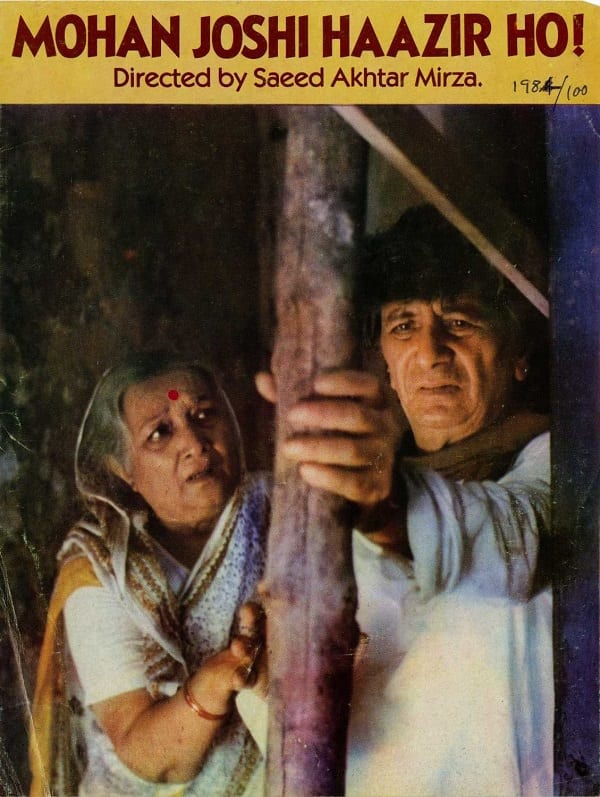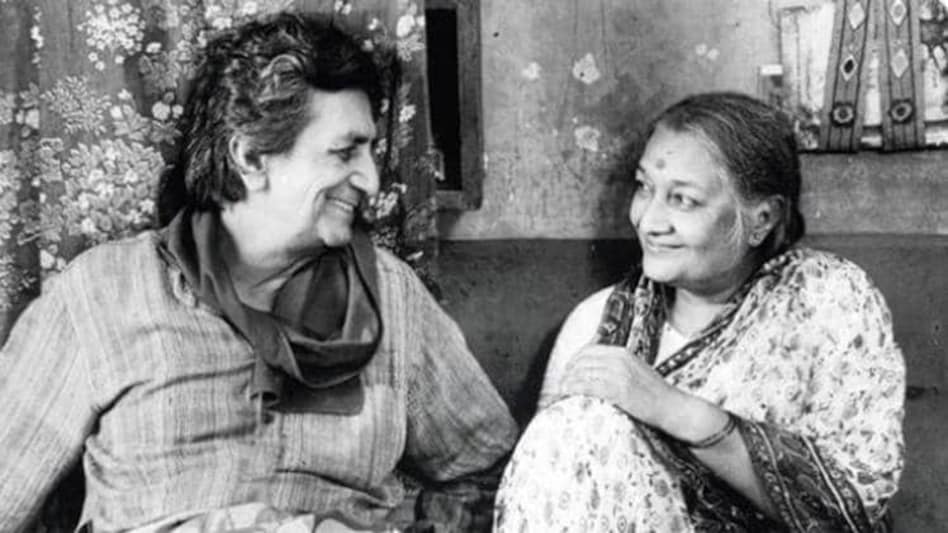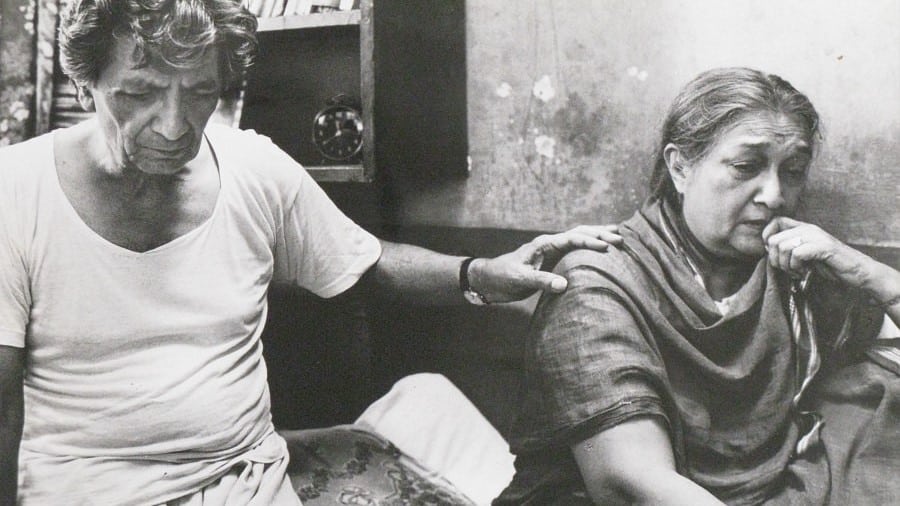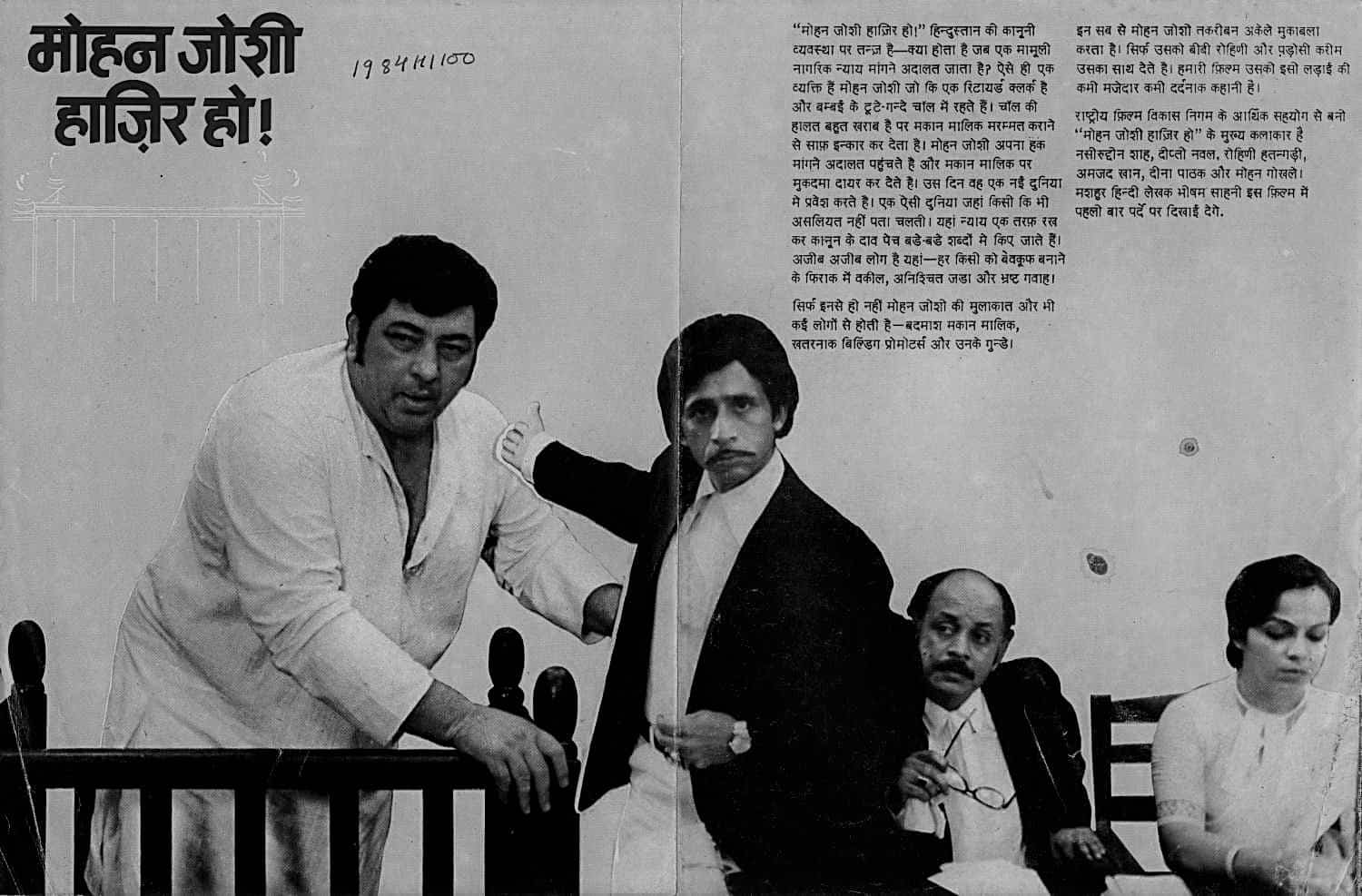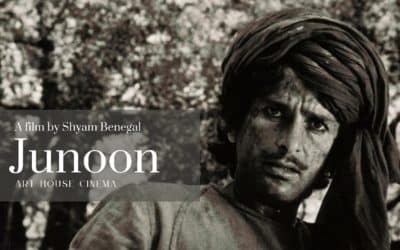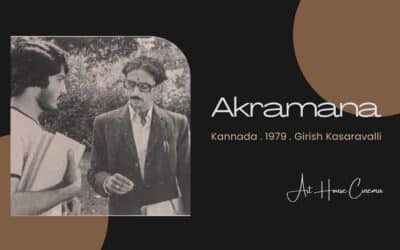Mohan Joshi Hazir Ho! is a 1984 Hindi film directed by Saeed Akhtar Mirza. Based on a story penned by Mirza, the film tells the story of an elderly couple who decide to take on the corrupt nexus of the rich and the law and pay dearly.
Mohan Joshi Hazir Ho! is considered among the most important films of the Indian Parallel Cinema movement. It also marks a rare occasion when famous author Bhisham Sahni decided to act in a film. It went on to win a National Film Award.
Cast
- Bhisham Sahni – Mohan Joshi
- Deena Pathak – Joshi’s Wife
- Naseeruddin Shah – Malkani
- Amjad Khan – Kundan Kapadia
- Rohini Hattangadi – Rani (Advocate)
- Pankaj Kapoor – Promoter
- Salim Ghouse – Promoter
- Satish Shah – Advocate
- Mohan Gokhale
- Anjali Paigankar
Crew
- Direction – Saeed Akhtar Mirza
- Story – Yusuf Mehta, Saeed Akhtar Mirza, Sudhir Mishra
- Cinematography – Virendra Saini
- Editing – Renu Saluja
- Music – Vanraj Bhatia
Synopsis
Mohan Joshi is a naïve old man. He does not appreciate the fact that he is one of the privileged few who actually have a home to live in. So what if the sewage pipes leak on his head throughout the year, and the plaster peels off the ceiling without notice? It all begins when old Joshi is standing in the queue at the milk booth one day, when the man in front of him boasts how he sued the landlord of his uncle, giving the man something to worry about for years! What a grand idea! Why cannot Mohan Joshi demand that his landlord provides the minimum running repairs for a flat where the Joshi family has lived for three generations, and paid the rent too?
Joshi and his wife decide to meet the landlord first and give him a chance to redeem himself. However, the greedy Kapadia, bloated with his already overflowing wealth, is surrounded by an army of real estate sharks. He will get more money when the tenements collapse and high-rise buildings are constructed in their place. Insulted and humiliated, Joshi marches off in righteous indignation in search of a lawyer. His neighbors ridicule him, his family refuses to help him. Only his wife stands by the stubborn old man. Clientless lawyers pounce upon the two old people like a pack of hungry wolves. Out of the fray, Malkani and Gokhale emerge the victors, and Joshi becomes their first client.
Malkani and Rani, the lawyers from opposing parties, are literally in bed together. Naseeruddin Shah and Rohini Hattangadi.
The courtroom battle begins. The case starts and stretches on as all court cases do. The old couple part with their meager savings and the old woman’s last bits of jewelry. The slippery lawyers promise great results. However, days turn to months and months to years, without the day of reckoning ever coming within sight. The landlord hires Desai and Rani, whose claim to fame lies in the fact that they can harass the opponent into submission with their unscrupulous tactics. That’s exactly what they set out to do. The Joshis are slapped with an assault case and an eviction suit to complicate the original case. The neighbors watch Joshi’s humiliation with glee, some of them bait him mercilessly and even fill their pockets by helping the landlord against Joshi. Threatened by the hired goons of the landlord, even his elder son, and daughter-in-law join the battle.
In the meanwhile, Malkani and Gokhale progress from a desk in the corridor to a swanky office. Rani marries Desai but continues a clandestine affair with Malkani. Between the four of them, the case drags on while the promoters wait for their chance to build a sea of buildings from Bombay to Dubai. Judges come and go, and sections and sub-sections clash in mid-air in the courtroom. The Joshi family is tossed between impatience and total despair. Their tenement home creaks and groans under years of neglect. Even old Joshi begins to see through the farce.
Finally, when the whole family starts bearing down on the lawyers, Malkani decides to make an unexpectedly passionate appeal in the court, demanding that the judge sees for himself the state of affairs. The judge agrees and the world changes color for Mohan Joshi. He becomes a hero overnight. This will not only fix his problems but will be a means of redressal for the whole community. Mohan Joshi gets a standing ovation from his new friends. The mill of justice may grind slowly, but now there is no holding back.
However, what the tenants have not factored in is, the slyness of Kapadia and his slick lawyers. An army of workmen descends on the crumbling building, sweeping the dirt away, giving a new coat of paint to cover the cracks, propping the falling roof with painted poles. At the end of it, the building wears an undeniably festive look when the judge finally arrives. The two sets of lawyers stand on either side of the judge and carry on a slanging match. The tenement dwellers watch helplessly as the whole spectacle becomes another legal battle that would remain undetermined. In desperation, they try to intervene to have the last hearing. But the judge is not interested anymore. It seems like a lost cause now.
There is only one way left to Mohan Joshi. Putting all his frail strength together, he decides to end the dispute once and for all. He bangs his head against the bamboo scaffoldings holding the roof together. The rickety ceiling comes down crashing, vindicating Mohan Joshi, and buries him under the rubble.
Commentary
A democracy, theoretically, gives every citizen a right to seek redressal for a wrong done to them by approaching the court of law, such are their constitutional rights. However, the wheel of justice is often stuck in the slush of bureaucracy, manipulation of witnesses, unscrupulous lawyers, and indifferent judges. In an individual vs a cartel, justice is often a chimera for the Mohan Joshis of this world. In the ramshackle tenements of the great metropolis, families survive for generations in deplorable conditions without even as much as squeaking, for even a small token of protest can bring the rickety system comes crumbling down on their heads. After all, what right can a citizen have when they do not even have a roof of their own above their head?
Mohan Joshi Hazir Ho! Acquires its timelessness from the failure of the judicial system of the country to reform itself. It is as relevant in 2022, as it was in 1984. The real estate mafia still reigns supreme, abetted by the very system that was made to protect ordinary citizens.
The film captures the aging and the loneliness of the protagonists as the narrative progresses, in a perceptive and witty manner that is both ironic and disturbing. The life of lower-middle-class families in the Bombay of the 1980s is accurately represented, by the daily struggle for basic necessities, long queues, overcrowded trains, and streets and crumbling roads that provide no respite from the pigeon holes that go for homes.
Bhisham Shani lives the role of Mohan Joshi to perfection. He breathes life into the character of a simple old man who continues to trust his make-believe idealistic world despite being broken down into pieces. Dina Pathak provides able support to him. Naseeruddin Shah adds a touch of dark comedy in his role as a corrupt lawyer. Other actors have done well in their respective roles.
Mohan Joshi Hazir Ho! is an underrated pillar of Indian parallel cinema, and is one of the best works of Saeed Akhtar Mirza. An evocative piece of cinema that wants to bring a change, it stays with you long after the credits have rolled.
Awards & Recognition
- 32nd National Film Awards – Best Film on Family Welfare
Reference
- DFF Archives – Indian Cinema 1984
- Wikipedia – Mohan Joshi Hazir Ho!
- Upperstall – Mohan Joshi Hazir Ho!
- O.P. Srivastava – Pillars of Parallel Cinema


